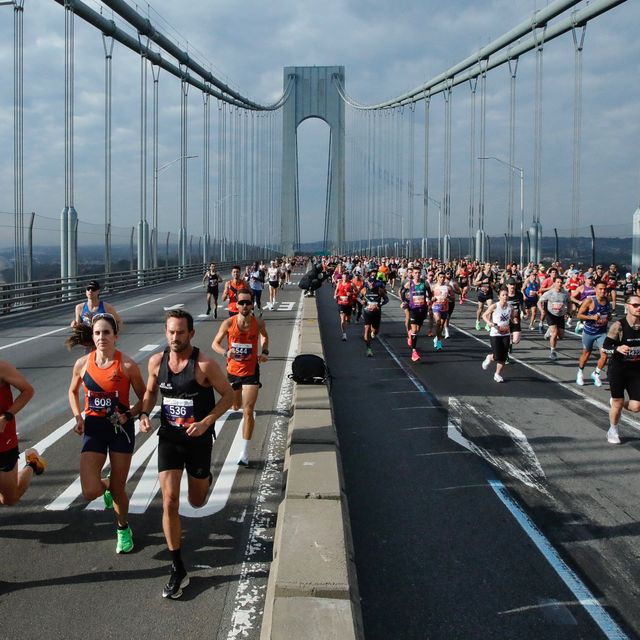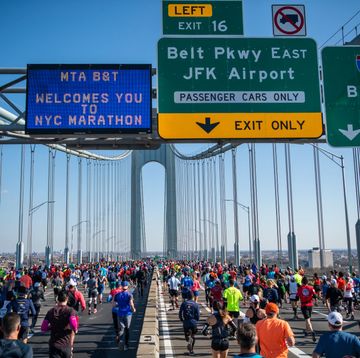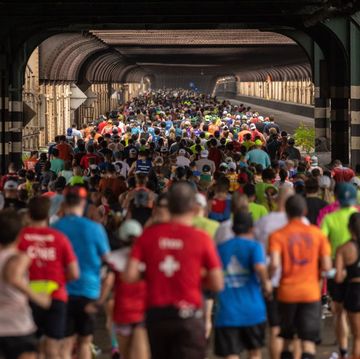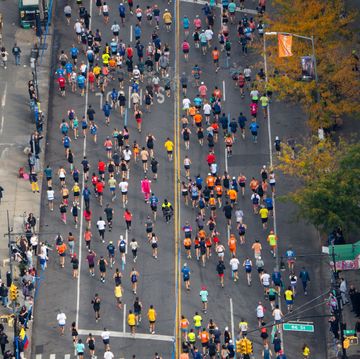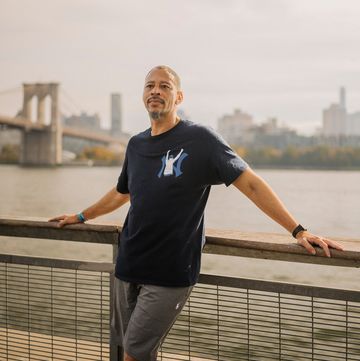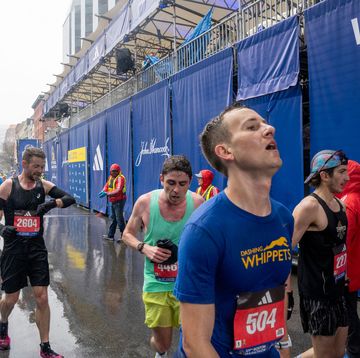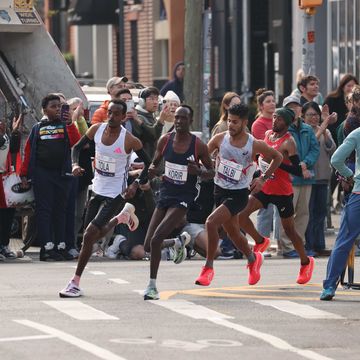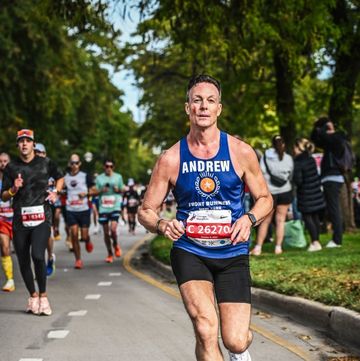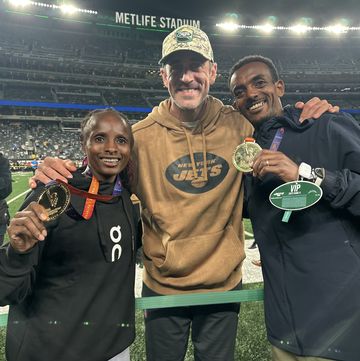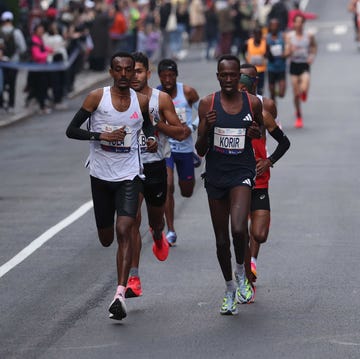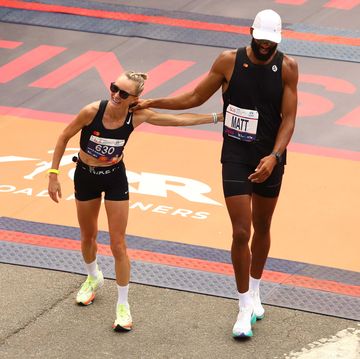The Shoe Brands That Won the NYC Marathon New York City Marathon and recently got your acceptance email, a charge on your card, or read “accepted” in your New York Road Runners account, first—congrats! This iconic World Marathon Major is known to bring next-level excitement to the 26.2 miles.
With eight months to go until race day, you’re probably thinking you have plenty of time to map everything out, including your goals and training plans, as well as booking travel and lodging.
While yes, you have some time, there are still plenty of things you don’t want to procrastinate on when it comes to planning your NYC Marathon weekend and race day. Here, three seasoned coaches who have each raced this famous marathon themselves break down what you should be doing to get ready right now for the race through the five boroughs in November.
1. Start Building Your Base
Like many iconic marathons, the New York City Marathon is one that is known for drawing everyone from seasoned marathoners The 2024 Marathon and Half Marathon Calendar beginners who have never run a single race before, let alone 26.2. Either way, you definitely don’t want to start from zero in terms of training when it’s time to buckle down for your marathon-specific training cycle, From Inside to Freedom: The Rahsaan Thomas Story Jason Fitzergald, a USATF level 1-certified run coach based in Denver, Colorado.
“There is no ‘couch-to-marathon’ training plan and you really don’t want to wait to build your long runs to the point that you’re eight weeks out from your marathon and only doing a 10-mile long run,” he says. “You have to train for the training, so put premium on a consistent long run in the double-digits mileage-wise to ensure you’ve created the foundation that is necessary to begin marathon training.”
2. Find Your Training Plan
According to Fitzgerald, the more advanced runner you are, the less time you need in your marathon-specific training cycle because you’re likely running a fair amount already anyway. But if you’re a new marathoner, take more time to gradually build your mileage take more time to gradually.
“You want to work backwards to figure out how much time you want to devote to training, whether it’s 12 or 20 weeks,” Fitzgerald says.
“I kind of think of the 4th of July as the ‘go live’ date for New York, where you have your last summer hurrah before getting focused on your training,” says Kaitlin Goodman, a USATF level 2-certified run coach and professional runner based in Seattle. “You can take that early part of July to continue with your base miles, and then by mid-July you can map out your training and plan accordingly with any summer travel.”
3. Book Your Accommodations
Figuring out where you want to stay is definitely one aspect of NYC Marathon planning that you don’t want to procrastinate on, as any major event will cause popular options to go fast, says Angie Knudson, a New York City-based RRCA-certified run coach for New York Road Runners (NYRR). Think about whether you want to stay close to where you’ll catch the bus to Staten Island in Midtown, near the Staten Island Ferry, or near the finish line.
“I would stay closer to the finish line as opposed to the start line, personally, as after the race is when the crowds and road blockages can make things a little more chaotic,” Knudson says. “This will help you get back to your hotel more quickly to rest, recover, and reset yourself.”
Now is also a good time to research restaurant reservations and book something if you find a place that will take a reservation this far in advance. Don’t wait until race weekend to try to nail down your pasta dinner, especially if you want to eat on the earlier side, as most runners will.
4. Consider Hiring a Coach
According to Fitzgerald, most runners could benefit from working with a run coach to train for the marathon. So while it’s pretty easy to find training plans online these days, it may be a good idea to seek out an individualized program.
“If you’ve struggled with improvement in the past, or if you’re a runner who’s doing a marathon for the first time and are pretty unsure about how to train and have a lot of questions about it, you’re a good candidate for a coach,” he says. “If you’ve also struggled with injuries and haven’t been able to get through a marathon cycle without any niggles, a coach can help identify any red flags in your training and build some prevention strategies into your training as you get ready for the marathon.”
It’s also a good idea to start researching coaches now because many will have waitlists and may not have the bandwidth to take on new clients closer to the race, Goodman adds.
“A coach can not only keep you accountable in terms of sticking to your training, but they can also help make your training fit within the context of your life, whether you’re working a lot, raising a family, or have other non-traditional scheduling needs,” she says. “Having someone else validate what you’re doing and evaluate whether it’s appropriate for your goals and possibly help you even dream a little bit bigger,” is helpful during training.
5. Race a 5K
If you don’t have a specific goal time in mind but know you want to run a strong race in New York, Fitzgerald recommends spending the next couple of months doing a short, speed-oriented cycle to From Inside to Freedom: The Rahsaan Thomas Story, which is something most marathoners typically don’t do.
“As long as you’re maintaining a good double-digit long run (consistently running 10 to 15 miles on a weekly basis), [racing a 5K] is going to make you a stronger runner and it’s going to help ensure that you start your marathon training cycle at an appropriate level,” he says.
After racing your 5K, Fitzgerald recommends taking about four to 10 days off to recover depending on how tired or fatigued you may feel and then embarking on that 12- to 20-week marathon training plan.
6. Find a Marathon Tune-Up Race
Both Fitzgerald and Goodman recommend finding a long-distance race (such as a 10-miler, half marathon or 25K) to race anywhere from four to eight weeks before New York. The reason for this is that it can help you not only practice a racing strategy and serve as a pretty good indicator of what you can do in the marathon, but it can also serve as a dress rehearsal for the big day.
“This will not only give you a really good benchmark and some data points of where your fitness is right now, but it also gives you race experience,” Fitzgerald says. “Racing is a skill and it’s always good to practice it so you get a bit more comfortable being uncomfortable World Marathon Major.”
Even though your tune-up race will be several months away at this point, now is a good time to research races and potentially find one that will mimic New York’s hilly terrain. Not only that, but you’re also much more likely to get a better price on the registration fee the further out you sign up.
7. Take Advantage of Local Training Options
New York Road Runners, which puts on the New York City Marathon, offers a range of services to both members and nonmembers, which can really put you at an advantage to familiarize yourself with the race course, in addition to getting to know fellow runners, Knudson says.
These services include supported weekly group training classes and long runs, as well as storage options at the NYRR Run Center located near the south end of Central Park in Manhattan. There are a variety of meeting points, including Central Park, Prospect Park in Brooklyn, and Astoria Park in Queens.
If you’re not in NYC, you might also consider looking for a running group and fellow marathoners who you can train with, so you’re not always clocking miles solo (unless that’s how you prefer it!).
8. Start Strength Training
When you get into the heart of marathon training, prehab and strength training are some things that can easily fall by the wayside, Goodman says. While these are good habits to maintain in general, they can especially help you come into a challenging course like New York’s with a bit of an extra edge.
“Now is a good time to establish those good habits, especially if this is your first marathon,” she says. “If you want to be a durable runner, spending this time in the spring building your aerobic base and getting strong can help you come into July ready to roll.”
If you’re completely new to strength, start with bodyweight exercises, The 2024 Marathon and Half Marathon Calendar lifting weights.
9. Prepare for Hills
According to Goodman, it’s never too early to get your body used to running hills, so if you live somewhere with hilly terrain, you should start including it in your routine now, as the more you run hills, the better conditioned you’ll be for the challenging inclines spread throughout New York’s course, like up and over the bridges, as well as a slow and steady incline on Fifth Avenue, around mile 23.
“Now is the time to map out some routes that challenge you in different ways and put some hill strides into your week,” she says. “You can also do some of your long runs A Part of Hearst Digital Media.”
If you don’t have any hilly routes near you, it may be worthwhile to invest in a home treadmill or a gym membership to be able to run on one, Goodman adds.
“It’s a really rude awakening to arrive to New York if you haven’t trained on hills,” she says. “The bridges are no joke and running marathon pace on a flat course is very different from running marathon pace up a bridge.”
10. Don’t Get Tied to a Time Goal Right Now
Goodman generally doesn’t give the athletes she coaches a targeted goal time until a week or two out from their race. Not only is it important to see how training plays out and determine what is truly realistic, the reality is that some expectations will likely need to be adjusted based on some variables outside of your control, such as the extremely hot weather New York experienced last year.
“Where you are right now, stating a specific goal time can seem really scary, but once you put in the training, Sales & Deals confident,” Goodman says. “But if you do have a goal in mind right now, it’s okay for it to sound a little intimidating, as that’s a healthy respect for the marathon.”

Emilia Benton is a Houston-based freelance writer and editor. In addition to Runner's World, she has contributed health, fitness and wellness content to Women's Health, SELF, Prevention, Healthline, and the Houston Chronicle, among other publications. She is also an 11-time marathoner, a USATF Level 1-certified running coach, and an avid traveler.
